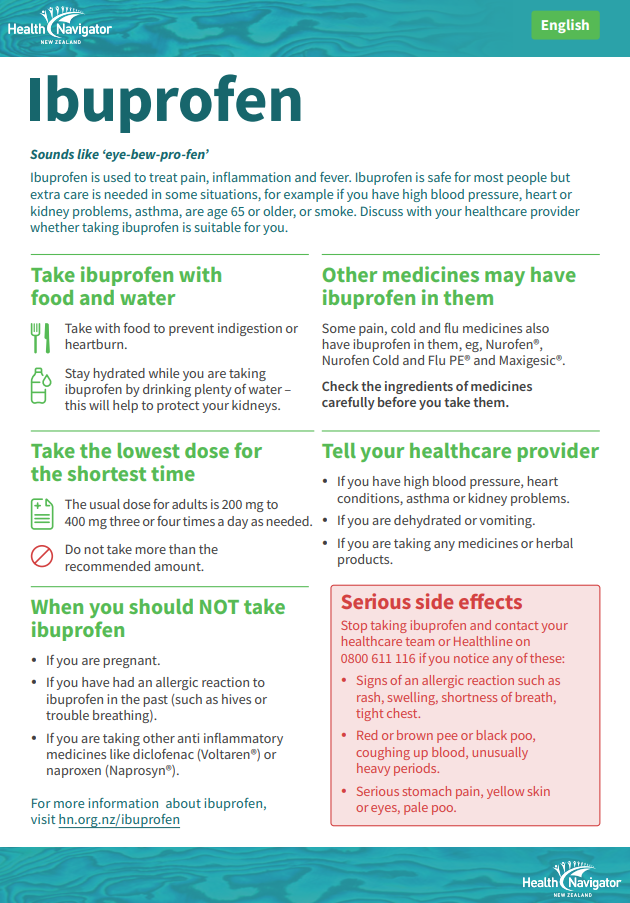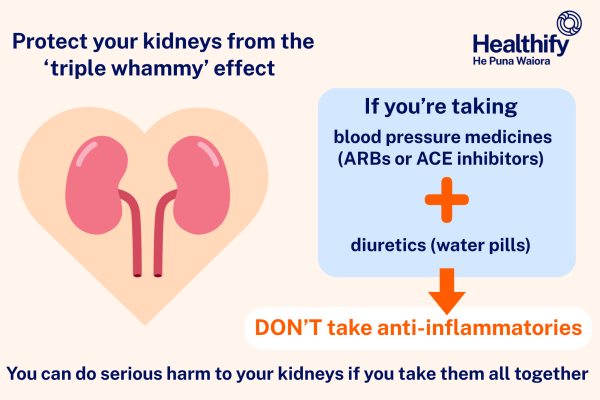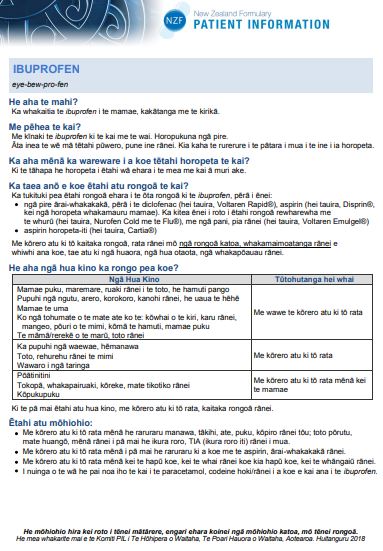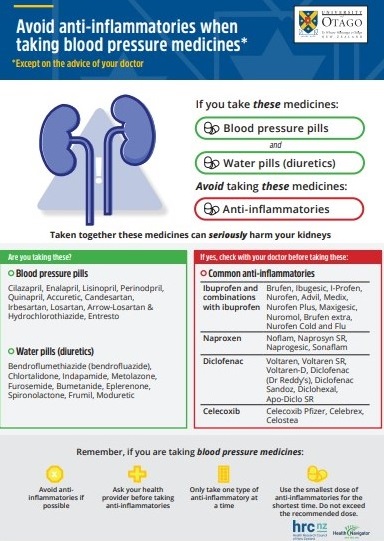You can now add Healthify as a preferred source on Google. Click here to see us when you search Google.
Ibuprofen for adults
Sounds like 'eye-bew-pro-fen'
Key points about ibuprofen
- Ibuprofen is used to treat pain, inflammation and fever.
- Ibuprofen is in a group of medicines known as non-steroidal anti-inflammatory drugs (NSAIDs).
- Find out how to take it safely and possible side effects.
- Note: The information on this page is about ibuprofen for adults. For information about giving ibuprofen to children, see ibuprofen for children.

Note: The information on this page is for ibuprofen in adults. For information about ibuprofen in children, see ibuprofen in children.
Ibuprofen belongs to a group of medicines known as non-steroidal anti-inflammatory drugs (NSAIDs).
It's used to treat different types of pain such as headache, migraine, dental pain, back pain or muscle pain, and pain from injury. Read more about pain and pain relief medication. It also helps to ease redness and swelling, and to treat fever.
Ibuprofen is available in different brands and strengths
In Aotearoa New Zealand ibuprofen is available in many forms such as capsules (100 or 200 mg), immediate-release tablets (200 or 400 mg), slow-release tablets (800 mg) and liquid suspension (100 mg in 5 mL or 200 mg in 5 mL).
There are also ibuprofen melt-in-your-mouth tablets, skin patches and topical gels to apply to skin over the painful area. Read more about NSAID gels.
The lower strength (200 mg) tablets can be bought from a supermarket or over-the-counter from a pharmacy. The higher strength (400 mg and 800 mg) tablets are only available with a prescription from a prescriber.
Ibuprofen is commonly known by different brand names, eg, Nurofen®, Advil®, I-Profen®, Brufen® and Fenpaed®.
Ibuprofen is sometimes combined with other medicines, eg: Maxigesic®, Brufen extra®, Nuromol®, Nurofen Cold and Flu®, Sudafed PE Sinus and Anti-inflammatory Pain®, Bi-gesic®.
Factsheet: How to take ibuprofen
 Ibuprofen factsheet
Ibuprofen factsheet
Healthify He Puna Waiora, NZ, 2022
English [PDF, 290 KB], te reo Māori [PDF, 241 KB], Samoan [PDF, 219 KB],Tongan [PDF, 253 KB], Chinese (simplified) [PDF, 501 KB],Cook Islands Māori [PDF, 1.4 MB]
The dose of ibuprofen will be different for different people depending on your condition and which strength of medicine you're taking.
- Always follow the directions on the package or pharmacy label. If you don't know how much to take, check with your pharmacist.
- The usual dose for adults is 200 mg to 400 mg, 3 or 4 times daily if needed.
- If you take ibuprofen 200 mg tablets 3 times a day, leave at least 6 hours between doses.
- If you take ibuprofen 200 mg tablets 4 times a day, leave at least 4 hours between doses.
- Take the lowest dose for the shortest time. Usually, you should only need to take ibuprofen for a short time, eg, while you have pain or swelling. Use the lowest dose that works for you and stop as soon as you can.
- Don't take more than the recommended amount, which for adults is usually 1200 mg per day. High doses can be harmful. Your healthcare provider may prescribe a higher dose while you're under their medical supervision – up to 2400 mg per day.
- Swallow them whole: Take ibuprofen with a full glass of water and stay hydrated while you're taking it, to protect your kidneys. Swallow the tablets or capsules whole, don't crush or chew them.
- Food: If ibuprofen causes a stomach upset, take it with or just after food.
- Alcohol: Limit or avoid alcohol while you're taking ibuprofen. Alcohol can increase the risk of side effects such as stomach upset, feeling tired and dizziness.
- Driving: Ibuprofen can make you feel tired or dizzy. Be careful when driving or using tools until you know how this medicine affects you.
- Missed dose: If you forget to take a dose, take it when you next need pain relief and then continue as before. Don't take 2 doses together to make up for a missed dose.
Ibuprofen patches are available to buy over the counter in supermarkets and pharmacies. In Aotearoa New Zealand, they're not funded by the government.
These patches are suitable for adults needing short-term relief from pain caused from strains, sprains or osteoarthritis. The same precautions apply as when taking ibuprofen tablets or capsules. Read more about the precautions and what to know before using ibuprofen.
Ibuprofen patches release the medicine slowly over 24 hours.
- Apply the patch to clean, dry, unbroken skin.
- The patch is flexible so it can be put close to or over a joint.
- Don't cut the patch.
- Keep the patch dry. Don't cover it with plasters or other bandages.
- Don't take ibuprofen capsules or tablets while wearing an ibuprofen patch.
- You can use one patch every 24 hours for up to 5 days in a row. You'll need to remove the patch each day before you apply a new one.
- If you still need pain relief, remove the patch before you replace it with a new one after 24 hours.
Read more about using medicine skin patches safely.
For most people, taking ibuprofen is safe but extra care is needed in some situations, for example if:
- you're dehydrated from vomiting (being sick) or diarrhoea (runny poo)
- you have high blood pressure
- you have heart or kidney problems or asthma
- you're 65 years of age or older
- you smoke
- you're taking some other medicines (see below).
When you should NOT take ibuprofen
Ibuprofen should NOT be used in some situations as it can be harmful. For example, don't take it if you:
- have current or previous stomach problems such as ulcers or bleeding
- have ulcerative colitis or Crohn's disease
- are pregnant
- have heart or liver failure or chest pain (angina)
- have had a stroke or heart attack
- have chronic kidney disease
- have had an allergic reaction (such as hives or trouble breathing) to ibuprofen, aspirin, or other similar medications (discuss with your healthcare provider)
- are taking medicines to reduce blood clots (anticoagulants) such as warfarin, dabigatran and rivaroxaban
- are also taking other anti-inflammatory medicines, eg, diclofenac (Voltaren®), mefenamic acid (Ponstan®), naproxen (Naprosyn®) or celecoxib (Celebrex®)
- are taking some blood pressure medicines such as ACE inhibitors, ARBs, diuretics – if so, always check with your healthcare provider before taking NSAIDs.
Read more about the risks associated with NSAIDs.
Taking ibuprofen with other medicines
Ibuprofen interacts with some medicines, herbal supplements and rongoā Māori, so check with your healthcare provider before taking ibuprofen.
Read more about taking ibuprofen with other pain medicines or taking ibuprofen with blood pressure medicines.
Ibuprofen is found in many pain medicines you can buy from the pharmacy, such as Nuromol® and Maxigesic®.
Serious side effects can happen if you take more than 1 ibuprofen-containing medicine. If you do take other medicines containing ibuprofen, be careful not to take more than the recommended dose of ibuprofen each day, which is usually 1200 mg.
Don't take other anti-inflammatory medicines such as diclofenac, naproxen or celecoxib while taking ibuprofen. This can increase your risk of side effects.
It's safe to take ibuprofen with paracetamol because they work differently.
Ibuprofen interacts with some medicines, especially those used for high blood pressure, so check with your healthcare provider or pharmacist before you start taking ibuprofen.
Image credit: Healthify He Puna Waiora
Taking NSAIDs together with blood pressure medicines can be harmful to your kidneys. This is called the ‘triple whammy’. If you're taking blood pressure medicines (ACE inhibitors or ARBs) and diuretics, tell your healthcare provider or pharmacist before starting ibuprofen. Talk to them about safe pain-relief options for you.
- Examples of ACE inhibitors are captopril, enalapril, lisinopril, perindopril, quinapril and ramipril.
- Examples of ARBs are candesartan, irbesartan and losartan.
- Examples of diuretics are furosemide, bumetanide, bendroflumethiazide, chlortalidone, hydrochlorothiazide, indapamide, spironolactone, eplerenone and metolazone.
Read more about the triple whammy effect.
Like all medicines, ibuprofen can cause side effects, although not everyone gets them. If you're concerned about any symptoms you think might be related to your medicine, talk to your healthcare provider. The information below offers some guidance but doesn’t include all possible side effects.
Common side effects
Tell your healthcare provider if these side effects bother you.
- Heartburn (indigestion), sore stomach, runny poo (diarrhoea). Take diclofenac with food.
- Headache.
- Mild skin rash.
- Feeling dizzy or tired. Don’t drink alcohol. Be careful when driving or using tools until you feel better.
Tell your healthcare provider immediately or phone Healthline free on 0800 611 116 if these occur
- Serious stomach problems such as really bad stomach pain, blood in your stool or black stools, cough or vomiting up blood or dark-coloured vomit.
- Chest pain, shortness of breath or trouble breathing.
- Signs of a stroke such as weakness in one part or side of your body and slurred speech.
- Signs of kidney problems such as swollen ankles, blood in your pee or not peeing at all.
Phone 111 for an ambulance or go to your nearest accident and emergency (A&E) clinic if these occur
- Signs of an allergic reaction such as itchy skin, and rash, swollen lips or tongue, problems breathing, such as a tight chest or shortness of breath.
Read more about medicines and side effects and reporting a reaction you think might be a side effect.
The following links provide further information about ibuprofen.
Ibuprofen(external link) NZ Formulary Patient Information, NZ te reo Māori(external link)
Ibuprofen Relieve 200mg (Viatris)(external link) Medsafe Consumer Medicine Information, NZ
Brochures
Ibuprofen factsheet(external link) Healthify He Puna Waiora, NZ, 2022 English(external link), te reo Māori(external link), Samoan(external link), Tongan(external link), Chinese (simplified)(external link), Cook Islands Māori(external link)
Ibuprofen in te reo Māori(external link) My Medicines, NZ, 2018
Avoiding anti-inflammatories when taking blood pressure medicines(external link) University of Otago, NZ, 2021
5 questions to ask about your medications(external link) Health Quality and Safety Commission, NZ, 2019 English(external link), te reo Māori(external link)
References
- Ibuprofen(external link) New Zealand Formulary
- Non-steroidal anti-inflammatory drugs(external link) NZ Formulary
- Non-steroidal anti-inflammatory drugs (NSAIDs) – making safer treatment choices(external link) BPAC, NZ, 2013
- Avoiding the triple whammy in primary care – ACE inhibitor/ARB + diuretic + NSAID(external link) BPAC, NZ, 2018
- Managing pain in osteoarthritis – focus on the person(external link) BPAC, NZ, 2018
- Ibuprofen and impaired renal function – keep your fluids up(external link) Medsafe, NZ, 2019
- Nurofen® Duralast (ibuprofen) dermal patch for musculoskeletal pain(external link) Research Review, NZ, 2021
Brochures

Healthify He Puna Waiora, NZ, 2022
English, te reo Māori, Samoan, Tongan, Chinese (simplified), Cook Islands Māori
My Medicines, NZ, 2018

University of Otago, NZ, 2021
Credits: Healthify editorial team. Healthify is brought to you by Health Navigator Charitable Trust.
Reviewed by: Angela Lambie, Pharmacist, Auckland.
Last reviewed:
Page last updated:





